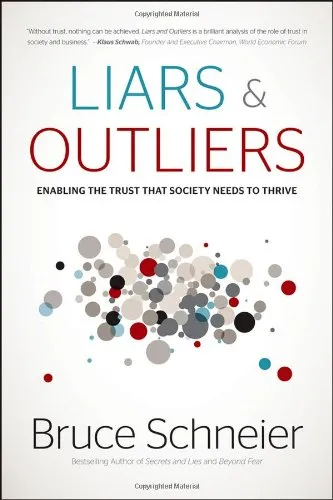Liars and Outliers: Enabling the Trust that Society Needs to Thrive
4.5
Reviews from our users

You Can Ask your questions from this book's AI after Login
Each download or ask from book AI costs 2 points. To earn more free points, please visit the Points Guide Page and complete some valuable actions.Introduction to "Liars and Outliers: Enabling the Trust that Society Needs to Thrive"
Trust is the foundation of society. Without trust, collaboration, cooperation, and the complexities of human civilization cannot sustain themselves. But how do individuals and groups sustain trust in a world where self-interest, betrayal, and deceit often challenge the very fabric of societal cohesion? In "Liars and Outliers," Bruce Schneier—a renowned expert on security and technology—dives deeply into these questions to explore the delicate interplay between trust and security, and their influence on societal structures.
At its core, "Liars and Outliers" examines why people generally act in ways that align with societal interests rather than simply prioritizing their own personal gain. Schneier introduces the concept of “cooperative systems,” which are essential for the trust that makes cooperation possible on nearly every level—between individuals, within organizations, and across nations. Through its engaging narrative and detailed examples, the book demonstrates how society has developed mechanisms to compel trustworthy behavior and mitigate betrayal, even in systems where some level of cheating or betrayal is inevitable.
Detailed Summary of the Book
Schneier begins by outlining the historical and evolutionary significance of trust and explains how it has been instrumental in humanity’s development. He introduces a framework to understand the dynamics of trust in large, complex systems, where cooperation is both essential and fragile. Trust, the author argues, doesn’t emerge spontaneously—it requires frameworks, pressures, and systems to enforce it.
The book introduces the tension between individual incentives and societal good—a recurring conflict Schneier dubs the "trust dilemma." Individuals are incentivized to game systems for personal benefits, while society requires individuals to cooperate and follow rules. This interplay creates the balance between “trustworthy” behavior and the occasional outliers—those who lie or cheat. Schneier delves into the mechanisms societies adopt to maintain this balance, which include social pressures, reputational systems, laws, and security technologies.
Schneier highlights examples of trust-building in ecosystems, from primitive societies to contemporary frameworks. Early societies relied on kinship and close social networks to enforce cooperation, but as human populations grew more complex, these simple systems proved insufficient. Governments, institutional frameworks, and advanced security mechanisms became necessary to maintain trust and stability in larger-scale systems.
The author discusses how trust-building mechanisms have adapted to the digital age, where the lines between anonymity, accountability, and trust have become blurred. Schneier uses real-world examples to demonstrate the risks of excessive reliance on technology and institutions for maintaining trust—warning of the societal breakdowns that occur when trust erodes completely.
Key Takeaways
- Trust is essential for cooperation and collaboration in all human systems, from the micro to the macro level.
- Societal stability depends on enforcing trustworthy behavior while accommodating and mitigating some level of betrayal.
- Individuals constantly balance self-interest against collective interests, which leads to inherent tensions in any trust-based system.
- Security mechanisms serve as essential tools for enabling trust, but they must be balanced with protections for individual freedom and privacy.
- With the rapid evolution of technology, traditional methods of fostering and enforcing trust need to adapt to meet new challenges.
Famous Quotes from the Book
"Trust enables society to thrive. Without it, the very foundations of human interaction crumble."
"Liars and outliers keep trust systems healthy by testing their boundaries—forcing adaptation and improvement."
"Security is not a solution to the trust problem. It is a tool to help us navigate trust in a complex world."
Why This Book Matters
In a world increasingly driven by technology, global interactions, and complex systems, understanding trust and its role in society is more important than ever. "Liars and Outliers" equips readers with a nuanced understanding of how trust works, why it breaks down, and how mechanisms like security and social frameworks help reinforce it. Schneier's exploration is not just theoretical but profoundly relevant to how modern societies function.
Whether you are a technologist, a policymaker, a business leader, or simply a curious reader, this book provides valuable insights into the delicate interplay between trust, security, and cooperation. Its lessons extend far beyond the digital world into every aspect of human behavior and societal organization.
Ultimately, "Liars and Outliers" is not just about trust—it is about how trust enables societies to grow, innovate, and thrive even in the face of constant challenges. In a time when trust is often challenged by economic, political, and technological disruptions, Schneier’s work offers a timely, thought-provoking, and actionable framework for rethinking how we build and maintain trust.
Free Direct Download
You Can Download this book after Login
Accessing books through legal platforms and public libraries not only supports the rights of authors and publishers but also contributes to the sustainability of reading culture. Before downloading, please take a moment to consider these options.
Find this book on other platforms:
WorldCat helps you find books in libraries worldwide.
See ratings, reviews, and discussions on Goodreads.
Find and buy rare or used books on AbeBooks.
1185
بازدید4.5
امتیاز50
نظر98%
رضایتReviews:
4.5
Based on 0 users review
"کیفیت چاپ عالی بود، خیلی راضیام"
Questions & Answers
Ask questions about this book or help others by answering
No questions yet. Be the first to ask!


